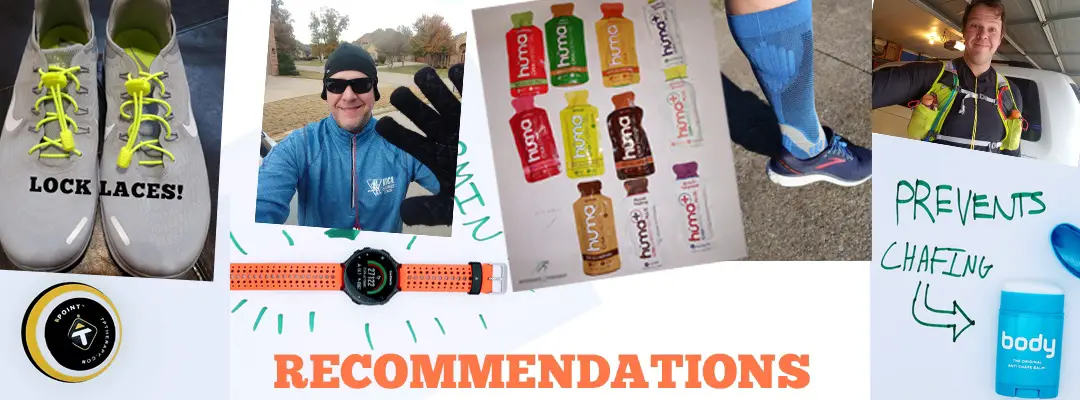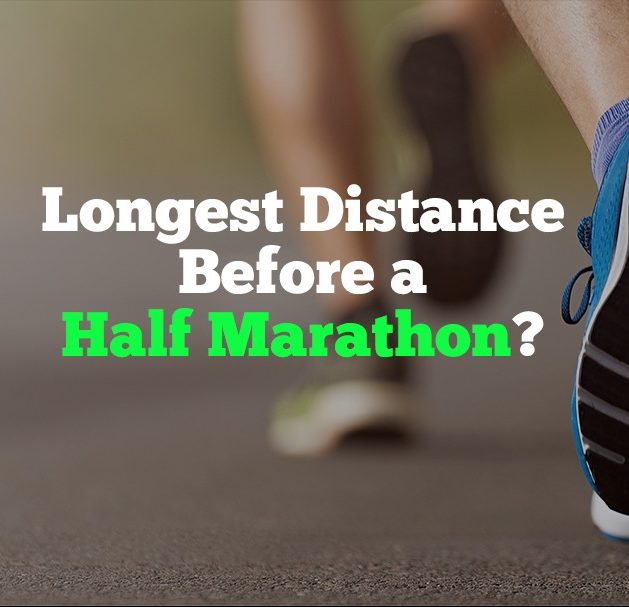First-time half marathon runners seem to ask this question a lot, I’ve got this question at least a dozen times over the past few months. While there is no 100 percent perfect answer to this question, you can use the current weekly volume coupled with fitness level and longest run distance to date to determine an answer.
What is the longest distance you should run before a half marathon?
As long as a runner has run a long-distance greater than or equal to 9 miles twice within the previous 3 weeks leading up to a half marathon, they should be able to finish the half marathon race with some possible discomfort around miles 11 and 12.
How discomforting will the latter miles be if I only run 9 miles before a half marathon?
This depends on the fitness level of the runner, as well as weekly volume, and longest run distance to date. Another big variable is whether or not you care if you have to walk the last couple of miles in a worst-case scenario situation. A half marathon is an endurance event that requires long-distance training. The best way to build long-distance endurance is by running long distances once a week over weeks of training. If you’re trying to shortcut this, you could easily become injured if attempting to run the entire half marathon with little training.
Ask yourself these questions to see if you could be able to finish a half marathon race:
What are your race goals?
A PR or timed goal?
If this sounds like you then you probably need to put in the long run that lasts up to 12 or 13 miles. You’re probably going to run the majority of the race. If you plan on running a majority of the race you should have put the long-distance training in and not cut it short.
Just wanting to finish the race to the best of my ability (complete not compete)?
If this sounds like you then you can get away with a couple of 10-mile runs before your half marathon race. If you need to race with a run/walk or walk/wan method then you should have no problem finishing the race, even if you have to walk a few half a miles in the latter miles.
The excitement of the race and adrenaline will keep you going. Also if you remember to carb-load two nights before your half marathon race, you will have a topped-off fuel tank on race day. Don’t forget to fuel as well during your race with 30-50 grams of carbs per hour. For more information on pre-race nutrition and fueling a half marathon check out both of these detailed posts: what should I eat before a half marathon and how many energy gels do I need to take for a half marathon race.
You can possibly finish the race but walking is more your style?
If you’re wanting to walk a half marathon you need to look at two different factors. The race cut-off time should never be less than 4 hours or you need to walk your half marathon on the same racecourse as a marathon. Must walkers, that have spent time training, should be able to finish a half marathon in 4 hours. If a half marathon race cut-off time is three hours or less, do not attempt to run this race. Most walkers will not be able to finish a half marathon in 3 hours.
If you select a half marathon race on the same racecourse as a marathon you will have a much broader window of time to finish your half marathon race. You can easily get an extra 2 to 3 hours of extra race time when your race coincides with a marathon race. If you want to walk a half marathon check out this detailed post about pacing tables for walkers: can you walk a half marathon in 4 hours?
First time half marathoners
If this is your first half marathon race, don’t forget these 3 simple things when it comes to training:
- When you’re racing you’ll have an extra boost factor that comes from the sheer excitement of the race as well as adrenaline kicking in when you’re racing. You can run mile after mile during training without seeing either of these benefits. I would venture to say that your excitement and adrenaline on race day help give you an extra 20% boost of determination, motivation, and perseverance. While some might argue that these could easily be attributed to psychological factors of simply tricking your brain, I would disagree. I’ve run 12+ half marathons and these little things always make my race days more invigorating.
- As a new long-distance runner you need to increase your mile gradually, I would say no more than 10% a week. This is roughly about 1 mile (2.2 km) each week. If you stick to this pattern for ten to fifteen weeks you will slowly build your base and increase your aerobic endurance at the same time.
- Don’t forget the long run is not about speed, it’s about putting in the miles to increase your ability to run longer distances. Slow down your pace by 1 to 2 minutes. log your miles. Don’t worry about how long it takes.
Does it matter what day your long run is performed on?
No. Try to select a day that you can schedule up to two 2 hours for a run. Make sure you’re giving your body at least 24 hours to rest after one of your longer runs.
Is 10 miles enough before a half marathon?
Yes, 10 miles will be enough to get you to the half marathon finish line. I would recommend more mileage but as long as you complete at least 2 long-distance runs around 10 miles you should be able to cross that half marathon finish line and collect your shiny medal!
Are you looking for a great way to display your medals? Check out the post I wrote reviewing the 9 best medal display hangers for runners.
Can I run a half marathon if I can run 8 miles?
The answer to the question depends on your physical fitness. If you’ve never run a half marathon before and the longest distance you’ve ever run is 8 miles, I don’t recommend you attempt the half marathon, UNLESS, you end up walking the last 5.1 miles. Could you possibly finish the half marathon with only 8 miles underneath your belt? Yes. However, as a coach, I can’t recommend that you approach your first half marathon in this fashion. Spend the time to train correctly and face the half marathon with a good level of running endurance.
If you’ve run a half marathon before and you’ve recently only been logging 8 miles and under, then your body is more accustomed to what’s going to happen on the racecourse. Your mental strength should be able to get you to the finish line with little problems.
Average half marathon time
Depending on who you ask, the average half marathon time varies. Years ago the average half marathon time was close to about 2:00 hours. Now with more racers registering for half marathons, the average time has fallen somewhere around the 2:30 mark. Why has this average time changed so drastically? Partly because more non-elite and non-competitive racers have started running half marathons at much slower paces thus skewing the data. It’s a positive change in our society. I would rather someone walk an entire half marathon and barely beat the cut-off time than sit at home binge-watching shows. Some elites don’t like the fact that many “non-runners” now participate in the sport originally for runners. I, on the other hand, welcome all runners, walk/runners, and walkers to conquer a half marathon. The participation of more runners has seen a large surge overall for race participation and retail sales of running clothes, equipment, smartwatches, etc.
How long should it take to run a half marathon?
Determining your predicted half marathon race pace and finish time is a lot easier than it seems. For a quick way to figure out how long it might take you to run a half marathon check out this post, how long should it take to run a half marathon?
Half marathon tips for beginners
Every marathon runner had to learn what all new runners discover. They either learned by trial and error, through education and books, or through a running coach. Before you set out on the path to becoming a first-time half marathon race finisher, learn as much as you can. Some things you’ll have to learn yourself such as the correct fuel for runs, the correct breathing patterns when you run, and knowing when your body is getting tired. For a good starting point, check out this post, 102 half marathon tips for beginners.
| Help support me and subscribe to my YouTube channel. YouTube video - 30 ways to make your runs less painful! Coach Scott's Credentials:
|
To sign up for a FREE half marathon training schedule, log sheet, and pace predictor CLICK HERE.

Recommended gear for runners
Connect with me:
| facebook.com/BeginnerToFinisher/ |
